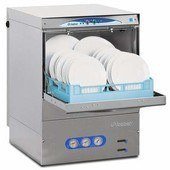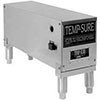Commercial vs Residential Dishwasher Guide

Table of Contents
Compare electrical, plumbing, and installation requirements before buying a commercial dishwasher for home or business use
Commercial dishwashers require 208-240V electrical service, floor drains, and often ventilation; making home installation costly ($2,000-$5,000+ in modifications). They use 0.86-1.5 gallons per rack and complete cycles in 1-4 minutes, versus 3-6 gallons and 45-90 minutes for residential models. For most homes, the installation costs don't justify the benefits unless you're running a catering business or have existing commercial infrastructure.

Commercial dishwashers can make a difference in how many people a restaurant can serve. The right dish/glasswasher can be the backbone of any commercial foodservice operation. They're highly efficient at taking care of large amounts of dish and glassware which makes them sought after in the residential market. However, there are a few things you need to know before diving into the purchase of a shiny new stainless steel dishwasher for your home. Below you will find a comparison of residential and commercial dishwashers. Many people have pulled off having a commercial glass or dishwasher in the home.
Additional pumps or devices, such as booster heaters, may need to be purchased for installation. No additional equipment is needed usually, only the proper electrical and plumbing. Residential dishwashers are more cost-effective for in-home applications. When using in bulk and rapid applications, commercial dishwashers save both time and money.
ALWAYS consult the installation manual and a licensed professional when it comes to safety including but not limited to: electrical, plumbing, and chemicals.
Commercial vs Residential Dishwasher Quick Comparison
| Requirement: | Commercial Dishwasher: | Residential Dishwasher: |
| Electrical | 208-240V (often 3-phase) | 115-120V standard outlet |
| Water Temperature | 120-180°F (high-temp needs booster) | 120°F |
| Drainage | Floor drain required | Sink drain with pump |
| Water Usage | 0.86-1.5 gallons/rack | 3-6 gallons/cycle |
| Cycle Time | 1-4 minutes | 45-90 minutes |
| Ventilation | Hood often required (high-temp) | Built-in condensation |
| Equipment Cost | $2,000-$15,000+ | $400-$1,500 |
| Installation Cost | $500-$5,000+ | $150-$300 |
1. Electrical & Plumbing
Electrical Considerations

Commercial Dishwashers: Some dishwashers require a higher electrical rating. For example, higher voltage dishwashers will require additional wiring or multiple breakers. Dishwashers with detergent pumps and booster heaters require additional wiring also. The large majority of dishwashers available on the commercial market require at least 208V.
A vast amount of commercial dishwashers require three-phase electrical hookups. Even commercial applications usually require a new installation for three-phase electricity. A licensed electrician is required for any of the electrical installations.
Residential Dishwashers: Most residential dishwashers only require a 115-volt power line, and some are equipped with an actual power cord that can plug into a typical residential wall outlet. This makes installation very simple. It also means that most washers do not require any special breaker or wiring your home is not already equipped to handle.
A licensed electrician is required to install any electrical line that is a wall or breaker installation.
Plumbing
Commercial Dishwashers: Commercial dishwashers cannot use plastic or PVC pipes and fittings due to the heat which normal plumbing typically cannot withstand. They also have a higher pressure, so typical orifices may not be strong enough.
Commercial dishwashers do not have a dry cycle. Glassware can typically dry within 30 seconds in a high temp washer, but they are still designed to drip dry to a floor drain with the racks positioned out.
Commercial dishwashers wash with high amounts of water. Due to this, they require a stronger drain pump and most often are designed for a floor drain.
Residential Dishwashers: Pressure couplings typically used in the installation process of a residential undercounter dishwasher are readily available at most plumbing retailers and only cost a few dollars. Most of the time they can be installed with only the aid of an instruction manual.
A typical sink drain generally suffices. If it does not, it will be specified by the residential manufacturer.
Residential dishwashers are usually built with an internal drain pump or drain system that propels the drainage water out of the unit. Therefore since most home dishwashers are made for undercounter purposes, they might require extra installation.
2. Commercial Dishwasher Plumbing Requirements
If you're considering a commercial dishwasher, whether for a restaurant or home installation, understanding the plumbing requirements is essential for proper planning and code compliance.
Water Supply Requirements
- Pipe size: 3/4" copper minimum recommended (1/2" may work for small undercounter units)
- Water pressure: 20-25 PSI minimum; if pressure exceeds 25 PSI, install a pressure-reducing valve
- Backflow prevention: Air gap or ASSE 1004 device required by plumbing code
- Connection: 3/4" male connection typical; water supply hose usually included
Drainage Requirements
- Floor drain: Required for most commercial units using direct connection
- Indirect connection alternative: Air break to standpipe, floor sink, or trench drain
- Drain slope: 1-2% minimum gradient for gravity drainage
- No backwater valve: Backwater valves are prohibited on the dishwasher branch drain
- Location: Floor drain must be adjacent to the dishwasher
Hot Water Temperature Requirements
| Dishwasher Type: | Incoming Water Temp: | Final Rinse Temp: | Additional Equipment: |
| Low-temp: | 120°F minimum (130°F recommended) | 120-140°F | Chemical sanitizer dispenser |
| High-temp: | 120°F minimum | 180°F | Booster heater required |
Grease Trap Considerations
Commercial dishwashers handling dishes with food residue may require connection to a grease interceptor. Check local plumbing codes - minimum capacity requirements are typically 20 minutes retention time. A single-fixture grease trap should be at least 250 liters (55 gallons).
3. Dishwasher Types
Warewashing Chemicals
Commercial Dishwashers: Commercial dishwashers typically come in two varieties: High temp and Low temp.
Low temp washers require chemicals in order to sanitize. These chemicals sometimes cannot be found at local stores, since they must be purchased through a licensed chemical supplier. This can be less cost-effective.
Residential Dishwashers: Residential chemicals are readily available at local department stores. (Please see below Steam Output and Ventilation.)
Niche Washers
Commercial Dishwashers: Commercial dishwashers are generally designed for specific needs. For a bar setting, you may need to invest in a commercial glass washer machine.
Additional glass washing racks may be purchased to change the load-type of the washer, however, you must first research if different rack types are available for the model you are interested in.
The racks also require extra storage space. (Prepare for plenty of space. Commercial racks are generally quite large.)
Residential Dishwashers: Residential dishwashers are designed to take care of any family-size load and accommodate most wares on the market.
The market caters to the consumer by providing more and more utensils, plates, etc. that are residential dishwasher "proof".
4. Output Ventilation & Capabilities
Steam Output and Ventilation
Commercial Dishwashers: Commercial washers require any surrounding shelving and flooring to be stainless steel or masonry. The steam output will warp any surrounding wood (including flooring) and anything else in the same vicinity that is not metal, or stone, or is susceptible to water corrosion or corruption.
This can hold true for low temp washers as well. Even restaurants require the proper ventilation for safety concerns.
The chemical supplies used in commercial washers also require proper ventilation due to their harmful effects if inhaled. Check the product warnings and precautions before purchasing and using chemicals.
Residential Dishwashers: Residential dishwasher equipment is designed to not give off enough steam to damage surrounding cabinetry or flooring. The steam output can be regulated by government and association codes.
Residential washers typically rely on two types of chemicals; one for the wash and one for the rinse/dry cycle. Both can be purchased at local department stores for low costs. They generally do not require any special ventilation.
Capabilities (Drying and Three-Compartment Sinks)
Commercial Dishwashers: Commercial washers often use a tank or tub for storing heated water that is used as preheated water in between cycles. This streamlines the wash cycles and saves time, but is an unnecessary application to the one cycle washes typically used in the home.
As mentioned before, high temp washers, even though not equipped with a dry cycle, dry glasses in seconds, and ceramics in approximately less than 30 seconds. This is due to fast evaporation from such temperatures.
Plastic/rubberware usually cannot be washed in either high temp (due to definite melting or warping) or low temp (due to the harsh supply of chemicals).
Most commercial washers are not designed to remove large debris from a dish, glass, or utensil. The typical washing area of the commercial kitchen includes a three-compartment sink for someone to remove debris and/or large particles prior to being washed.
Residential Dishwashers: The standard water line for a residential washer is 3/4" in diameter. Meaning most sinks, if not already equipped, can be modified with simple tools to accommodate the drain of a dishwasher. (Likewise for the water supply pipe.)
Even with steam and heated dry cycles, dishes may not come out completely dry and may require hand toweling.
The sanitizing cycle of a residential dishwasher cannot compete with that of a commercial dishwasher. Stronger chemical supplies and higher temps are used with the commercial grade.
5. Commercial & Residential Cost Considerations
Basic Economics (Water, Utilities, Upfront Pricing)
Commercial Dishwashers: Commercial dishwashers are designed to get dishes clean quickly. With rapid dry times, this is the best option for commercial applications, as it looks out for the recipients' health and comfort.
More and more of these washers are being designed with energy efficiency and ecological impact in mind. High temp washers with no chemicals have a limited impact on the environment. Although, chemical washers require special instructions for handling and waste management.
Water efficiency: ENERGY STAR commercial dishwashers use approximately 0.86 to 1.5 gallons of water per rack. A busy restaurant running 280 racks per day uses roughly 88,000-132,000 gallons annually.
Due to the need for higher rated electricity and consumption, the electric bill needs to be taken into consideration. Look for the Energy Star™ seal when purchasing both commercial and residential dishwashers.
Commercial dishwashers can range from approximately one thousand dollars to several thousand dollars.
Residential Dishwashers: Residential dishwashers are designed with economics in mind. More often than not, they come with "eco-friendly" and economic cycles. Therefore, they're designed to save money and have a limited impact on the environment. (This is not guaranteed with all residential washers. Be sure to read the documentation before purchasing.)
Look for the Energy Star™ seal when purchasing both commercial and residential dishwashers.
Insurance Considerations
Commercial Applications: Companies abide by different standards and expectations set by insurance companies because certain risks are taken into consideration. Some insurance policies are designed with food service in mind.
Residential Applications: The average homeowner's insurance is generally designed in the opposite fashion and the homeowner takes as many precautions as possible.
Contacting your insurance agency will, if approved, increase your insurance.
Homeowners who do not seek approval from their insurance agency before installing risk losing their insurance.
6. Can You Install A Commercial Dishwasher In A Residential Home?

Yes, you can install a commercial dishwasher at home, but it requires significant modifications and careful planning. You could profit from owning a commercial-grade dishwasher if you find yourself constantly catering to outside guests, utilize or own a clubhouse, live in a multi-family home, or do any activity that could benefit from bulk washing your dishware.
This is only applicable if all of the previously mentioned precautions are taken into consideration and you've consulted with both your homeowner's insurance and a licensed installer (for plumbing and electricity).
What Home Installation Requires
Electrical Modifications ($500-$2,000)
- Dedicated 208-240V circuit with 30-50 amp breaker
- Professional electrician installation required
- Some undercounter models work on 115V single-phase (easier option)
Plumbing Modifications ($1,000-$3,000)
- Floor drain installation (most significant expense)
- Backflow prevention device
- Upgraded water supply line (3/4" copper)
- Possible grease trap connection
Ventilation Considerations ($500-$2,000)
- High-temp dishwashers may require condensate hood
- Steam output can damage surrounding cabinets if unventilated
- Low-temp models produce less steam but still need adequate airflow
Total Home Installation Cost Estimate: $2,000-$5,000+ beyond the dishwasher price
When a Commercial Dishwasher Makes Sense for Home Use
| Scenario: | Recommended: | Why: |
| Home-based catering business | Yes | Volume justifies cost; may be required by health department |
| Multi-family home (4+ adults) | Maybe | High daily volume; consider space constraints |
| Frequent large-scale entertaining | Maybe | If hosting 20+ guests weekly |
| Existing commercial kitchen | Yes | Infrastructure already in place |
| Standard family of 2-4 | No | Residential dishwasher is more practical |
Single-Phase Options for Easier Installation
Some undercounter dishwashers designed for small bars and cafes operate on 115V single-phase power—the same as a standard household outlet. These offer commercial-grade sanitation with simpler electrical requirements, though you'll still need a floor drain.
Shipping and Delivery Note
Lastly, another little aspect to keep in mind is if you have any commercial dishwasher equipment (even if it is an undercounter dishwasher) shipping to your home, be advised that if you don't pay for liftgate service, you will most likely be charged an extra fee to have it delivered with a liftgate truck. Even though your order may say free shipping, it doesn't mean that it includes the liftgate price because those are extra fees determined by the carrier delivering your equipment.
Frequently Asked Questions
Can I use a commercial dishwasher at home?
Yes, but with significant modifications. Most commercial dishwashers require 208-240V electrical service, a floor drain, and proper ventilation. Installation costs for home modifications typically run $2,000-$5,000 beyond the dishwasher price. Some undercounter models designed for small bars work on standard 115V power, making installation easier.
What electrical outlet does a commercial dishwasher need?
Most commercial dishwashers require 208-240V power, often with a 30-50 amp dedicated circuit. Some require three-phase electrical, which is rarely available in residential settings. A licensed electrician must install the proper wiring. Budget $500-$2,000 for electrical modifications.
How much water does a commercial dishwasher use?
ENERGY STAR commercial dishwashers use 0.86 to 1.5 gallons per rack, actually less water per dish than residential models, which use 3-6 gallons per full cycle. Commercial units achieve this efficiency through high-pressure spray and shorter cycle times (1-4 minutes vs 45-90 minutes).
Do commercial dishwashers need a floor drain?
Yes. Commercial dishwashers discharge large volumes of hot water quickly and require a floor drain for direct connection, or an indirect connection to a standpipe or floor sink. Residential-style drain pump connections are not rated for the temperature and volume. Installing a floor drain is often the most expensive home modification required ($1,000-$2,500).
What is the difference between high-temp and low-temp commercial dishwashers?
High-temp dishwashers sanitize using 180°F water in the final rinse and require a booster heater ($400-$1,500). Low-temp dishwashers sanitize using chemical sanitizers at 120-140°F. Low-temp units are easier to install and produce less steam, but have ongoing chemical costs ($50-$150/month for a busy operation). High-temp units may require ventilation but have no chemical expenses.
How long is a commercial dishwasher cycle?
Commercial dishwasher cycles run 1-4 minutes compared to 45-90 minutes for residential models. This speed is essential for restaurant volume but means dishes must be pre-rinsed. Commercial units aren't designed to remove heavy food debris. The typical commercial kitchen includes a three-compartment sink for scraping and rinsing before dishes enter the machine.
Are commercial dishwashers worth it for home use?
For most homes, no. The installation costs ($2,000-$5,000+) and utility requirements rarely justify the investment. Exceptions include: home-based catering businesses (where health codes may require commercial equipment), multi-family homes with high daily volume, properties with separate commercial-style kitchens, or homes with existing commercial-grade infrastructure.
Shop Commercial Dishwashing Equipment
- Shop All Commercial Dishwashing Equipment - Full selection of commercial dishwashers
- Undercounter Dishwashers - Compact units ideal for small operations; some work on 115V
- Glass Washer Machines - Purpose-built for bars and beverage service
- Booster Heaters - Required for high-temp dishwasher sanitization
- Dishwashing Parts & Accessories - Racks, chemicals, and replacement parts
Related Guides
- Commercial vs Residential Range Guide
- The Ultimate Commercial Kitchen Equipment Checklist
- Jackson Dishwasher Buying Guide
- New Restaurant Kitchen Equipment: Complete Startup Guide
References
- U.S. Department of Energy - Purchasing Energy-Efficient Commercial Dishwashers
- ENERGY STAR Commercial Dishwasher Specifications
Share This!